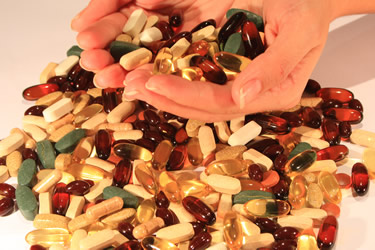Vitamin B12 for Depression: New research shows that those who suffer from depression respond better to their treatment if they have high levels of vitamin B12 in their blood. Researchers hypothesise that vitamin B12 helps manufacture compounds called monoamines in the central nervous system, a shortage of which is believed to be linked to depression.
8(BMC Psychiatry, 2003; 3:17.)

Essential Fatty Acids Reduce Hostility: Research has shown that high dietary intake of EFAs is related to lower likelihood of high hostility in young adulthood. Hostility has been shown to correlate with the development and manifestation of coronary disease.
5-6(Eur J Clin Nutr. 2004;58(1):24-31.)
Tomatoes Prevent Heart Disease: Lycopene, which has previously been found to help prevent some cancers, has now been found to play a role in preventing cardiovascular disease. More than 80% of the lycopene intake in the American diet is from tomato products but it is also found in watermelon, pink grapefruit, apricots and papayas.
7(Am J Clin Nutr, 2004; 79(1):47-53.)
Flavonoids as Anticancer Agents: Flavonoids such as luteolin, quercetin and apigenin are found in edible fruits and vegetables. Recent research has demonstrated that flavonoids can induce programmed cell death in ‘immortal’ cells. Tumour cells are described as immortal because they have somehow developed the ability to bypass the normal intrinsic timing mechanism within cells that result in their aging and death. Reversing this so-called ‘immortal’ mechanism has been the focus of cancer research for years.
Oncogene, 1996;13:1605-Life Sciences, 1997;60:2157.)
Grapes prevent stroke damage: Research has discovered that resveratrol, a compound in grapes, can absorb free radicals, minimising the damage they can cause in the brain as a result of a stroke. This nutrient has also been found to be useful in promoting longevity. Resveratrol can also be found in mulberries, peanuts and grape skins.
7(Science Daily November 27, 2003).

Lignans May Protect Against Prostate Cancer
A diet rich in lignans could reduce the risk of prostate cancer by 26%. High intake of food items rich in phyto-oestrogens (flaxseed, sunflower seeds, berries, peanuts, beans and soy) was associated with a decreasing overall risk of prostate cancer. This could be due to regulation of sex and/or growth hormones, antioxidant properties, apoptosis of prostate cancer cells (programmed cell death) or inhibition of metastasis (the spread of cancer cells.)
Blackcurrants May Help Prevent Alzheimer’s Disease
In addition to being high in antioxidants, blackcurrants contain compounds that appear to have a protective effect on the brain. These compounds (anthocyanins and polyphenolics) have a strong protective effect in cultured neuronal cells. They protect against Alzheimers by influencing the signalling pathways that help these neuronal cells communicate with each other.
(Chemistry & Industry; Issue 2, 23 Jan 2006.)
Benefits of fish Oil for Asthmatics
A new study shows omega-3 fatty acid supplements can protect against exercise-induced bronchoconstriction (EIB) in asthma sufferers. EIB is a temporary narrowing of the airways that can be triggered by vigorous exercise and is commonly seen in asthmatics. This study showed that the fish oil supplement improved overall pulmonary function.
Chest. Vol. 129, No.1, pp. 39-49.
Also see: The Truth about Supplements
